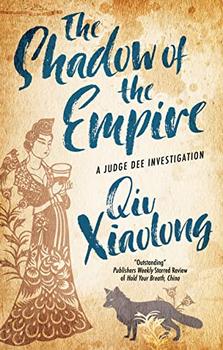Summary | Excerpt | Reviews | Beyond the Book | Read-Alikes | Genres & Themes | Author Bio

A Judge Dee Investigation #1
by Qiu XiaolongThis article relates to The Shadow of the Empire
 Chinese poetry has a long and varied history. The Tang Dynasty (from 618-907) is considered one of the most vibrant cultural periods for poetry and other arts.
Chinese poetry has a long and varied history. The Tang Dynasty (from 618-907) is considered one of the most vibrant cultural periods for poetry and other arts.
In Qui Xiaolong's mystery novel The Shadow of the Empire, set during the Tang Dynasty, detective Judge Dee professes to be a poet, and much of the plot is driven by clues held in poems. Judge Dee's investigation revolves around Yu Xuanji (pronounced "Yoo Shan-chee"), a real-life poet and courtesan.
Fortunately for today's readers, many poems from the era have survived the centuries and been widely translated. The Chinese tradition of writing poems in ink either on paper or as part of a painting scroll is one reason that ancient poetry survives. Woodblock printing was invented in China at the time of the Tang Dynasty, which allowed printers to reproduce many copies of the same text, either on paper or silk.
Though women had more opportunities for social mobility during the Tang Dynasty than in some of the other imperial eras, their options were still very limited. Most women gained status based on their husband's position. Unmarried women could elevate themselves in society as a concubine (second wife), courtesan, or priestess. Yu Xuanji checked all the boxes. At one time she was a concubine to a powerful official who sent her away to a remote temple to become a Daoist nun. There, Yu enjoyed the company of several men who held varying degrees of power, establishing herself as a (socially acceptable) courtesan. Yu composed poems about love, and also poems that were simply a testament to her experience. Although she was executed for the crime of murder at age 28, her words, intellectual viewpoint and emotional spirit endure.
Here is a fragment of "Living in the Summer Mountains":
"In a gauze dress
I read among my disordered
Piles of books.
I take a leisurely ride
In the painted boat,
And chant poems to the moon.
I drift at ease, for I know
The soft wind will blow me home."
(Translation by Kenneth Rexroth and Ling Chung)
Here is an excerpt from her love poem "Sending Spring Love":
"Steady as a pine, not like a rolling stone,
My oath of love is forever.
I long for the days
When we will be together again
Like the birds that fly
With one wing in common.
I walk alone with my regrets…"
(Translation by Kenneth Rexroth and Ling Chung)
The imagery here combines the poet's witness of nature with her emotional yearning for a distant beloved.
And from "To Zi'an Looking out across Han River in Sorrow":
"Myriads of maple leaves
upon myriads of maple leaves
silhouetted against the bridge,
a few white sails return late in the dusk.
How do I miss you?
My thoughts of you run
like the water in the West River,
flowing eastward, never-ending,
day and night.
(Translation by Qiu Xiaolong)
Zi'an was the married government official who kept Yu as a concubine, then exiled her to a Daoist nunnery, apparently due to his primary wife's anger.
For readers who want to explore more Tang Dynasty poetry, there are several other poems and poets featured in the appendix of The Shadow of the Empire. Please note that translations of Chinese poetry vary widely due to the intricate nature of the language and characters used to scribe the original poems. Ancient poetry illuminates aspects of a culture that might otherwise be obscured, centuries after the fact.
Yu Xuanji from Poems of Celebrities of the Past Dynasties (1773) by Lu Chang, courtesy of McGill University
Filed under People, Eras & Events
![]() This "beyond the book article" relates to The Shadow of the Empire. It originally ran in February 2022 and has been updated for the
November 2022 paperback edition.
Go to magazine.
This "beyond the book article" relates to The Shadow of the Empire. It originally ran in February 2022 and has been updated for the
November 2022 paperback edition.
Go to magazine.
Your guide toexceptional books
BookBrowse seeks out and recommends the best in contemporary fiction and nonfiction—books that not only engage and entertain but also deepen our understanding of ourselves and the world around us.